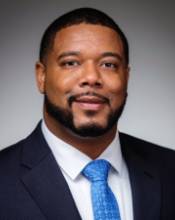Meet Your Student Conduct Administrators
We are here to support you! As your student conduct administrators, we support students, staff, faculty, and administrators by ensuring that students are getting the earliest possible support for their personal and academic goals.

Nick Mortaloni, Ed.D. LCSW
Dean of Student Affairs
Oceanside Campus
Building T100, Room T103
Colleen Maeder, M.S.
Director of Student Services
San Elijo Campus
900 Student Center, Room SAN 933
Mitra De Souza, M.Ed.
Director of Student Services
Community Learning Center (CLC)
Room CLC 329
Terrence Shaw, M.S.Ed
Director, Student Life and Leadership
Oceanside Campus
Building T100, Room T108
Our Approach to Student Conduct
MiraCosta College is an educational institution committed to supporting students. Therefore, all student conduct matters are addressed with learning and safety at the center of our practices. With a trauma-informed and equity-minded approach, student conduct administrators work to ensure that individualized learning and self-reflection opportunities are present throughout the conduct process. This means that the Standards of Student Conduct and Student Conduct Procedures exist to keep campus safe, support the learning environment, and serve as a framework for students to know and understand their rights and their responsibilities as members of the campus community.
Student Conduct Learning Outcomes
Students will:
- Understand the role of the Standards of Student Conduct in supporting our campus community, which values diversity, equity, and inclusion
- Increase their knowledge of their specific rights and responsibilities as students
- Gain tools, knowledge, and/or skills to support future behavioral choices that align with their goals
- Articulate the impact of their behavior on others from an equity-minded perspective
Student Rights & Responsibilities
- BP 5500: Standards of Student Conduct
- AP 5500: Standards of Student Conduct
- AP 5520: Student Conduct Procedures
- Student Conduct and Appeal Process Flowchart
Frequently Asked Questions
Established by the MiraCosta College Board of Trustees and superintendent/president with approval and input from the Associated Student Government (ASG), conduct administrators, restorative practice leaders throughout the San Diego community, the Standards of Student Conduct are designed to help support a safe, nurturing, and educational campus for our students, staff, faculty, and administrators. The Standards of Student Conduct were established to create a tangible set of standards for all students to abide by while engaging in our campus community, both inside and outside the classroom. This includes both online and on campus students to ensure equitable learning environments regardless of the learning platform or location. To read the complete Standards of Student Conduct, please see Administrative Procedure 5500: Standards of Student Conduct.
Students have the right to learn in a safe environment and report concerns. Students also have the right to know when concerns about them have been reported to student conduct administrators. This means that if a report has been made about a student who has allegedly not followed a standard of student conduct, a student conduct administrator will outreach to that student via email to request that they set up a Student Rights & Responsibilities meeting to discuss the situation. This email will also contain information about due process rights, the Standards of Student Conduct, and the policies and procedure for addressing matters related to student conduct. At a Student Rights & Responsibilities meeting, students can expect to have a developmental and educational conversation with a student conduct administrators, who will review the allegation of behavior, address any evidence provided, listen to the student’s perspective, address any questions they have about the process, and work with the student to discuss next steps depending on the student’s decision to accept responsibility or not accept responsibility for the alleged behavior. Next steps may include discussing outcomes such as educational resolutions or restorative practices, or other outcomes as appropriate.
When there is an allegation that the Standards of Student Conduct has not been upheld, student conduct administrators work with students to address the allegation with care. This is not a judicial process, but rather an educational one. While student conduct administrators are responsible to determine if a violation occurred, they do so through an educational lens with compassion, to uphold student rights, address accountability and campus safety, and provide prevention and intervention tools to support students while initiating appropriate resolutions. Students who are alleged to have violated a standard of student conduct will receive an email as listed in their SURF account. This letter will alert them that the Student Affairs office has been notified of alleged behavior that might be a violation of the Standards of Student Conduct.
All communication with students will be conducted utilizing the contact information located in the student’s SURF account. Students are responsible for updating their phone number and/or email address to support a timely and efficient correspondence. If you need support updating your contact information, please see the Admissions and Records Office.
Once you receive the email, please click on the link to retrieve your letter. From there, you will be prompted to log in with your SURF credentials. Unlike most log-ins for our campus, you must input the number “0” as the start of your student ID number rather than the letter “W.” This will be the only way to successfully open and view the letter. If you are still unable to retrieve the letter, please call 760.757.2121 x6260 to speak to the Administrative Assistant in the Office of Student Affairs.
Please read the letter carefully to understand the time-sensitive steps, as there will be important dates to consider in order to participate in the student conduct process. Any issued letter will provide you with relevant information to support you in the process, including your rights, responsibilities, and information on how to respond to the allegation. A student rights and responsibilities meeting is intended to address the concern, uphold the student’s due process rights, determine if the behavior occurred, offer an educational and developmental dialogue to discuss the impact of the behavior, and determine next steps with identified resolutions as appropriate. More information about the Student Conduct Procedures can be found in the Administrative Procedure 5520: Student Conduct Procedures.
Outcomes to an alleged violation of the Standards of Student Conduct include being found “Not responsible” or “Responsible.” Additionally, a referral to the Campus Assessment, Resources, and Education (CARE) Team may also be offered, in addition to an outcome or in lieu of one, to provide support and connection to on- or off-campus resources.
“Resolutions” are commonly known as sanctions and are things that may be assigned to the student if they have been found responsible for violating a Standard of Student Conduct. Examples of resolutions include warnings, educational resolutions, restorative practices, disciplinary probation and when necessary, suspensions or expulsions.
Educational resolutions are intended to support you during the conduct process and is aimed to provide opportunities for reflection and personal growth. Some examples are as follows:
- Research papers
- Reflection papers
- Participation in training or workshop
- Mentorship conversation
- Art/spoken word/music/poetry/Ted Talk
- Educational material
Restorative resolutions focus on addressing impact of behavior and reintegrating responding parties into the community. A restorative resolution requires the full agreement and voluntary participation of the responding party and other parties involved in the case, including but not limited to reporting parties and impacted parties. Restorative resolutions are designed to assist the responding party with identifying the impact or harm that was caused by their behavior, and provide a means for the responding party to repair that harm or impact as an active member of the community.
When necessary, resolutions such as warnings, disciplinary probation, withdrawal of consent to remain on campus, hold on student account, interim or long-term suspension, or expulsion may be activated.
Students can appeal the decision of long-term suspension, withdrawal of consent to remain on campus, and recommendation for expulsion. The appeal process can be found in Administrative Procedure 5520: Student Conduct Procedures.
Our Student Affairs team is here to support you through the process and we would be happy to connect and clarify anything that might be new to you or is unclear. If you need assistance navigating any aspect of the student conduct process, please call the office of your respective conduct administrator assigned in the issued letter. The contact information for the student conduct administrators is as follows:
Community Learning Center (CLC)
Mitra De Souza, M.Ed.
Director of Student Services, Community Learning Center
mdesouza@miracosta.edu
760.795.8719, CLC 329
Oceanside Campus
Nick Mortaloni, Ed.D. LCSW
Dean of Student Affairs
nmortaloni@miracosta.edu
760.757.2121 x6260
Student Center, OC 3441
Oceanside Campus
Terrence Shaw, M.S.Ed
Director, Student Life and Leadership, Oceanside Campus
tshaw@miracosta.edu
760.757.2121 x6899
Student Center, OC 3437
San Elijo Campus
Colleen Maeder, M.S.
Director of Student Services, San Elijo Campus
cmaeder@miracosta.edu
760.634.7806
Student Center, SAN 933





